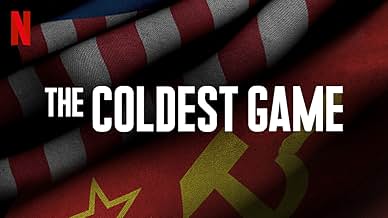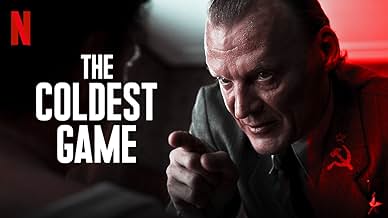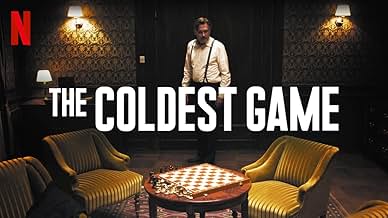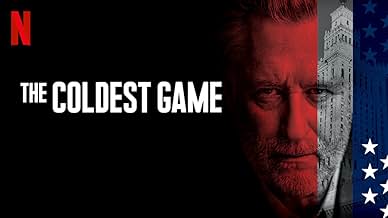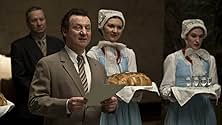During 1962's Cuban missile crisis, a troubled math genius finds himself drafted to play in a U.S.-Soviet chess match -- and a deadly game of espionage.During 1962's Cuban missile crisis, a troubled math genius finds himself drafted to play in a U.S.-Soviet chess match -- and a deadly game of espionage.During 1962's Cuban missile crisis, a troubled math genius finds himself drafted to play in a U.S.-Soviet chess match -- and a deadly game of espionage.
- Director
- Writers
- Stars
- Awards
- 3 wins & 13 nominations total
- Director
- Writers
- All cast & crew
- Production, box office & more at IMDbPro
Featured reviews
This is my first user review and I really feel like this movie deserves more than the current 6.3 score. Most of the negative reviews dig into the hows and why's of the Cold War, but has nothing to do with this movie. Okay, it's fictional and probably won't fit how things really went back in those days but there is so much good to say about this movie.
First of all: the acting performances are really great. Every personage fits well and keeps the story alive. Dohn Norwood is once again great. His mimics, gestures,... really blend in.
The atmosphere also gets really good. Dark, cold,.. it really sucks you in and make your experience the tensions of that moment in the Cold War.
This movie really surprised me and is well worth your time.
First of all: the acting performances are really great. Every personage fits well and keeps the story alive. Dohn Norwood is once again great. His mimics, gestures,... really blend in.
The atmosphere also gets really good. Dark, cold,.. it really sucks you in and make your experience the tensions of that moment in the Cold War.
This movie really surprised me and is well worth your time.
This is a spy thriller set during the Cuban missile crisis, and centred around a fictional chess match between the Soviet and US chess champions in Warsaw. The US player is indisposed at the last minute, and the Americans substitute the last US player to beat him in a game, a college maths professor with a drink problem, played by Bill Pullman, who no longer plays chess. It transpires that the CIA have an interest in the match, with a clandestine meeting set up. But who can be trusted?
Bill Pullman is a good actor and does his best with the material, but the plot is pretty thin, the kind of thing you might see in a single episode of a TV series. There are also some irritating errors. One CIA person says that they know Russians have sent ships to Cuba but were "too small" to carry nuclear warheads. This is ludicrous, as. a nuclear warhead measures maybe three feet by one, and weighs about 100 kg. It would fit in a canoe, never mind a cargo ship.
On the chess front, I am probably being picky as I play chess quite a bit, but there are also several annoying aspects. The person who oversees the game is an "arbiter", not a "judge", and players do not pass draw offers via the arbiter, they just ask the other player. I understand that for film reasons the players are playing their moves unnaturally fast, but near the start the Pullman character says that the opening will "come down to the Italian game or the Rousseau defence" after the Russian's first move is revealed. This is absurd, as the Italian game is somewhat rare at grandmaster level, and the Rousseau opening is extremely obscure and would never be played at really top level. As for someone who hasn't played chess for a couple of decades beating the top Soviet player, that SI extremely implausible. Even Garry Kasparov, former world champion and arguably the best player of all time, struggled to perform in a tournament when he made a brief comeback a decade or so after he retired.
I had more of a practical issue with the main information to be passed at the clandestine meeting, which seemed unlikely to really be the key to the Cuban missile crisis to me but I don't want to reveal a spoiler. The bigger issue is that the film rather plods along, with limited tension. It is watchable, but hard to really recommend.
Bill Pullman is a good actor and does his best with the material, but the plot is pretty thin, the kind of thing you might see in a single episode of a TV series. There are also some irritating errors. One CIA person says that they know Russians have sent ships to Cuba but were "too small" to carry nuclear warheads. This is ludicrous, as. a nuclear warhead measures maybe three feet by one, and weighs about 100 kg. It would fit in a canoe, never mind a cargo ship.
On the chess front, I am probably being picky as I play chess quite a bit, but there are also several annoying aspects. The person who oversees the game is an "arbiter", not a "judge", and players do not pass draw offers via the arbiter, they just ask the other player. I understand that for film reasons the players are playing their moves unnaturally fast, but near the start the Pullman character says that the opening will "come down to the Italian game or the Rousseau defence" after the Russian's first move is revealed. This is absurd, as the Italian game is somewhat rare at grandmaster level, and the Rousseau opening is extremely obscure and would never be played at really top level. As for someone who hasn't played chess for a couple of decades beating the top Soviet player, that SI extremely implausible. Even Garry Kasparov, former world champion and arguably the best player of all time, struggled to perform in a tournament when he made a brief comeback a decade or so after he retired.
I had more of a practical issue with the main information to be passed at the clandestine meeting, which seemed unlikely to really be the key to the Cuban missile crisis to me but I don't want to reveal a spoiler. The bigger issue is that the film rather plods along, with limited tension. It is watchable, but hard to really recommend.
This is a great and original spy thriller that cleverly knits together real historical events: the Cuba crisis, the Cold War and a politically laden chess match between a Russian and an American. But the film could have been much, much better if the writers had incorporated more realistic elements. As for other movies: fewer special effects, and more consultants (or a bit of Wikipedia), please...
To begin with, the narrative of the Cuba Crisis is outdated. The crisis had in fact been triggered by the earlier American deployment of nuclear SM-78 Jupiter missiles in Turkey, right on the border with the Soviet Union. The Soviets simply responded in kind to the aggression. And Kennedy did not 'stare down' Khruschev, saving the Free World. The crisis was resolved when he negotiated a then-secret treaty that included dismantling his Jupiters. Secrecy was important because Kennedy was very concerned with his re-election, and perhaps less so with annihilating the planet...
The chess match did indeed take place, but it was ten years after the crisis. Sadly, the movie gets few chess details right, even if many elements are indeed taken from the chess world. To begin with, top level players are not old men. These days, as in 1972, it is all healthy guys in their twenties. And you don't just come out of retirement for this; top players must constantly follow and study opening theory, and their opponents' repertoires and styles. Also, during such a match, top players have seconds, to help prepare games. Such a match could never have taken place behind the Iron Curtain; the 1972 Fischer-Spassky match was played in Reykjavík, Iceland. The movie also suggests that players move immediately after one another. This never happens, except in time trouble or during (very) obvious exchanges. When a player offers a draw, he may call an arbiter, not a "judge", and these offers are made after one has moved, not before. Players never, ever discuss the position during a game; you refuse a draw offer simply by making a move. There never are/were '15 minute breaks' in chess- the clocks just keep ticking. Games could be adjourned for the next day, where one player would secretely note down his next move in a sealed envelope that was kept by the arbiter. Finally, the chess talk in the movie is mostly nonsense- knights and bishops are equivalent pieces that are exchanged, is never a "sacrifice". Nonexistent gambits and other openings are cited.
What is true is that a world champ (Max Euwe) was a math teacher (not a professor), another had an alcohol problem (Aljechin) and players (Korchnoi, a dissident, playing Karpov) complained being 'hypnotized' by people in the audience. Also, in the famous 1972 match the paranoid and boorish (but brilliant) Bobby Fischer indeed failed to show up for (and forfeited) a game.
Perhaps more importantly, the movie's epilogue highlights the dangers of the nuclear arms race; the US and Russia have indeed recently torn up their treaty on intermediate missiles, following violations by the latter. Also, nuclear powers are obliged to reduce their nuclear arsenals, says the Nuclear Proloferation Treaty that many countries signed, but that is not quite happening while the SALT agreements are expiring ("do as we say, not as we do") making threats against rogue states that also want nuclear power (Iran, N-Korea) sound hollow.
To begin with, the narrative of the Cuba Crisis is outdated. The crisis had in fact been triggered by the earlier American deployment of nuclear SM-78 Jupiter missiles in Turkey, right on the border with the Soviet Union. The Soviets simply responded in kind to the aggression. And Kennedy did not 'stare down' Khruschev, saving the Free World. The crisis was resolved when he negotiated a then-secret treaty that included dismantling his Jupiters. Secrecy was important because Kennedy was very concerned with his re-election, and perhaps less so with annihilating the planet...
The chess match did indeed take place, but it was ten years after the crisis. Sadly, the movie gets few chess details right, even if many elements are indeed taken from the chess world. To begin with, top level players are not old men. These days, as in 1972, it is all healthy guys in their twenties. And you don't just come out of retirement for this; top players must constantly follow and study opening theory, and their opponents' repertoires and styles. Also, during such a match, top players have seconds, to help prepare games. Such a match could never have taken place behind the Iron Curtain; the 1972 Fischer-Spassky match was played in Reykjavík, Iceland. The movie also suggests that players move immediately after one another. This never happens, except in time trouble or during (very) obvious exchanges. When a player offers a draw, he may call an arbiter, not a "judge", and these offers are made after one has moved, not before. Players never, ever discuss the position during a game; you refuse a draw offer simply by making a move. There never are/were '15 minute breaks' in chess- the clocks just keep ticking. Games could be adjourned for the next day, where one player would secretely note down his next move in a sealed envelope that was kept by the arbiter. Finally, the chess talk in the movie is mostly nonsense- knights and bishops are equivalent pieces that are exchanged, is never a "sacrifice". Nonexistent gambits and other openings are cited.
What is true is that a world champ (Max Euwe) was a math teacher (not a professor), another had an alcohol problem (Aljechin) and players (Korchnoi, a dissident, playing Karpov) complained being 'hypnotized' by people in the audience. Also, in the famous 1972 match the paranoid and boorish (but brilliant) Bobby Fischer indeed failed to show up for (and forfeited) a game.
Perhaps more importantly, the movie's epilogue highlights the dangers of the nuclear arms race; the US and Russia have indeed recently torn up their treaty on intermediate missiles, following violations by the latter. Also, nuclear powers are obliged to reduce their nuclear arsenals, says the Nuclear Proloferation Treaty that many countries signed, but that is not quite happening while the SALT agreements are expiring ("do as we say, not as we do") making threats against rogue states that also want nuclear power (Iran, N-Korea) sound hollow.
Right off the bat (or board?), there is the fact that this is or rather was based on true events. You'll either be into that or not. Bill Pullman does everything to keep you engaged though. The movie or rather the story is a bit muddled and there certainly will be confusion for many. And while Bill Pullman is a pole, some might have a problem with engaging with the movie.
Feeling something, being excited and so forth. So there are flaws, there are certain things that could be better. But it also has some fine points and there are some interesting plot points happening and some characters and places (short cuts) that are almost worth watching this alone. Again, massively flawed but also quite entertaining in a weird way
Feeling something, being excited and so forth. So there are flaws, there are certain things that could be better. But it also has some fine points and there are some interesting plot points happening and some characters and places (short cuts) that are almost worth watching this alone. Again, massively flawed but also quite entertaining in a weird way
This is a captivating tale of the behind the scenes of a political chess match. Who would have thought there was so much going on behind a seemingly innocent series of chess games! It is a captivating story, with great acting as well. I really enjoyed it.
Did you know
- TriviaLead actor William Hurt broke his leg in an off-set accident a few days after filming started. The injury was so bad that he had to be replaced by actor Bill Pullman.
- GoofsThe American flag is displayed improperly on the wall during the chess match. According to US flag etiquette, the blue star field should always be displayed in the upper left hand corner when the flag is hung on a wall.
- Quotes
Agent Stone: God protects children, drunks, and the United States, as they say.
- SoundtracksZagubiona rozmowa
Music by Milosz Wosko
Performed by Przemyslaw Florczak, Sebastian Frankiewicz, Robert Murakowski, Maciej Szczycinski & Milosz Wosko
- How long is The Coldest Game?Powered by Alexa
Details
- Release date
- Countries of origin
- Official site
- Languages
- Also known as
- Ván Cờ Chiến Tranh Lạnh
- Filming locations
- Production companies
- See more company credits at IMDbPro
- Runtime1 hour 42 minutes
- Color
- Sound mix
- Aspect ratio
- 2.39 : 1
Contribute to this page
Suggest an edit or add missing content


![Watch Trailer [OV]](https://m.media-amazon.com/images/M/MV5BNTViYjYyZjYtOTI1NS00NzhhLTg3MDEtZGUxOTM3Mjc2OGU0XkEyXkFqcGdeQXRyYW5zY29kZS13b3JrZmxvdw@@._V1_QL75_UX500_CR0)
